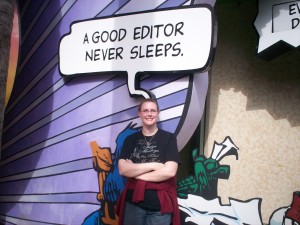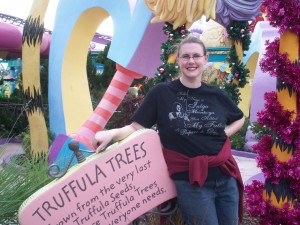 Domestic Engineering, Psychology
Domestic Engineering, Psychology  3 Comments
3 Comments The Censorship Quandary
The main job of parenting is to introduce your kids to the world outside your home in a way that best helps them make sense of it and learn to survive in it. You take them places, and show them things, then stand aside and anxiously watch them discover the joys and pitfalls for themselves. You clap and cheer, and dry tears and kiss scrapes. And it’s worth noting that this job isn’t only done by parents–any adult who deals with children experiences these things, and bears the honor and responsibility for those children’s formation.
The point of divergence among parents is when to expand the fence we build around our kids, to include new information and experiences. Obviously, this is a hot-button issue, laced with words like “censorship” and “age-appropriate” and “psychological trauma” that fuel an entire industry of researchers and trade paperback sales. Morals and memories of our own formative years have a powerful impact on our choices, as do our unique tastes. Sometimes, this veers in the absolute opposite direction from how we were raised. We resolve to raise our children with or without those influences: religion, politics, bad food, naughty words, even our extended family.
And sometimes, we lean into the curve of our own years, and urge our children into the shape of the things we’ve grown to love. The phrase “Where has this been all my life?!” is a strong predictor of parental behavior; the favorite shouted phrase of teenagers throughout time and space, “When I’m a parent, I’m never going to make my kid go there/eat that/do this!!” rarely factors in parenting decisions later in life. My husband and I are geeks who are making our living from an industry based on social experiences of play–it was a foregone conclusion that we would mold our little creations to share some of our offbeat enthusiasms. I showed Connor Star Wars when he was two, the same age at which I’d seen it (when it was first released in 1977), and Griffin was about the same age when I introduced him to Godzilla and all the other Japanese atomic monsters. And sure enough, they’re evolving nicely on the quick-witted, culturally referent, and wide-ranging track we set them.
But, inevitably, there are hitches in the unrolling of the tapestry of the world we lay at our children’s feet. Some, we never see coming. When Connor was born in the long, hot summer of 2002, we started watching “The Sopranos” on DVD to while away the humid evenings. He would actually stop nursing and look at the TV in recognition when the theme song came on. In large quantities, this show can have a deleterious effect on one’s language; I suddenly found myself saying, in the voice of Paulie Walnuts, “This f—ing guy!” whenever Connor would poop in a brand-new diaper. At the same time as we were awash in a stew of New Jerseyan profanity, I discovered that I no longer felt comfortable leaving live news on TV around my newborn son, a feeling that intensified as he grew to toddlerhood. I must admit, I am a news junkie; have been since high school. I mean, slap a vein and stick in a global 24-hour mainline–I want it all. So this discomfort came as a distinct shock to me as a new mother, a radical and instantaneous re-prioritization that told me I was no longer the same person I had always been, the first of many.
Other problems, we see coming and face with deep ambivalence. For instance: I swear. A lot. Not as badly as I did when I lived in France, but I’m somewhere between dockhand and a Naval officer on his ninth month at sea. I’ve tried to rein it in, but I just can’t force it entirely from my vocabulary, which will doubtless earn me the scorn of parents with more willpower. I’ve always believed in the concept that there are no bad words, only the wrong situations for them; calling them bad gives them more power, as most ably demonstrated by the Harry Potter novels. So I’m raising my kids to know that swear words are not appropriate for children, and are a reflection of strong emotions, and so far they get it. Connor, in particular, is still pained by my profanity, and regularly implores me to “be appropriate” around him, but I’m convinced he does this for the sheer joy of turning the tables on me. I’m also grappling with my awareness of the deeply bizarre American relationship with sex and violence. I’m determined not to be casual about violent themes and images, and to be less neurotic about anything to do with sex and gender, but the whole thing is fraught with conflict and difficulty. For now, I take it as a victory that my sons are some of the only young boys I know who don’t freak out at kissing or when I streak from bathroom to bedroom on the days I forget my robe.
We had a big turning point within the last week or so, with both boys. Griffin got himself suspended for a day by mooning his female classmates. When asked what on earth could’ve possessed him to do such a boneheaded thing, a thought occurred to me. Connor’s a huge fan of The Simpsons, and this was straight out of Bart’s playbook. I asked him, “Did you do it because you saw it on TV?” He nodded tearily, and mourned, “I did it so they would laugh.” So I’m having to re-evaluate the influences of tween tastes on the kindergarten set. Meanwhile, Cam has started playing Skyrim, and Connor is riveted by, of all things, the crafting. (I’m told WoW and FarmVille players will totally get the appeal.) He’s pleaded with us for permission to play on his own, so he can make leather and explore, but Cam firmly asserted that there was just too much violence and sexual content for a kid his age. I was more ambivalent, and argued that he wouldn’t necessarily even do some of the things we would be uncomfortable with, but I’m bowing to Cam’s vastly greater knowledge of video games.
It’s a comfort, though it seems wrong to put it like that, to say that some of the things that scared me the most as a child could never have been predicted, so sheltering my kids from everything isn’t going to inoculate them from every nightmare. The movie Gremlins scared the living crap out of me, and that was marketed directly at children, with tie-in toys and everything. And I was much more scared of nuclear war, as a Reaganbaby, than I was of anything I ever read–The Day After shook me so hard that it was incredibly hard to watch again as a grad student.
Similarly, one of Connor’s triggers couldn’t have been foreseen, or even insulated against. It took us a few years, until he could sufficiently articulate it, but extreme closeups of faces, especially not-completely-human faces, really freak him out. He went to see Spiderman 3–which is a horror in other ways, but I won’t get into that–at the movie theater, and none of the action or “adventure peril” bothered him at all. Instead, it was this one shot of Venom’s open mouth as he lunges at the camera that gave him fits. Likewise, there’s a scene in Fantastic 4 when Ben Grimm reveals his rocky deformation by turning his face out of shadow and lifting the brim of his hat. He leaves the room when that part of the movie is coming up, and that’s fine with me.
I console myself with the fact that we do so much with our children, and that guiding our kids through new experiences makes them less likely to be seeds of neurosis later in life. Sure, I’ve read Scary Stories to Tell in the Dark to them at Halloween–I even showed them the spooky-fantastic pictures by Stephen Gammell, which are apparently too scary to include in the latest republication. But I didn’t just give them the book and tell them to read it to themselves before bed. I was right there beside them, shivering at the gory parts and validating their fears by sharing my own. I think this prepares them for life much better than pure censorship can, and gives me the opportunity to shape their responses to their own feelings and impressions, by building a sense of empathy and honesty that I hope will serve us later when their lives get immeasurably more complex.
And if it doesn’t work, hey, I’m doing my part to support the psychoanalysts of the future.







